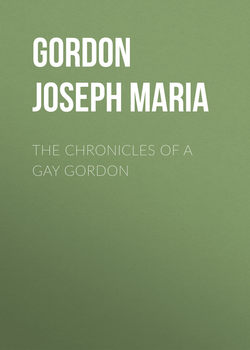The Chronicles of a Gay Gordon

Реклама. ООО «ЛитРес», ИНН: 7719571260.
Оглавление
Gordon Joseph Maria. The Chronicles of a Gay Gordon
BY WAY OF INTRODUCTION
BRIG. – GENERAL J. M. GORDON’S DESCENT AT A GLANCE
PART I
CHAPTER I. MY SCOTS-SPANISH ORIGIN
CHAPTER II. MY SCHOOLING
CHAPTER III. A FRONTIER INCIDENT
CHAPTER IV. FIRST WAR EXPERIENCE
CHAPTER V. MY MEETINGS WITH KING ALFONSO
CHAPTER VI. WITH DON CARLOS AGAIN
CHAPTER VII. MY FIRST ENGAGEMENT
CHAPTER VIII. SOLDIERING IN IRELAND
CHAPTER IX. UNRULY TIMES IN IRELAND
CHAPTER X. SPORT IN IRELAND
CHAPTER XI. A VOYAGE TO NEW ZEALAND
CHAPTER XII. A MAORI MEETING
CHAPTER XIII. AN OFFER FROM THE GOVERNOR OF TASMANIA
CHAPTER XIV. I BECOME A NEWSPAPER PROPRIETOR
CHAPTER XV. A MERCHANT, THEN AN ACTOR
CHAPTER XVI. AS POLICEMAN IN ADELAIDE
MILITARY APPOINTMENTS AND PROMOTIONS OF BRIGADIER-GENERAL JOSEPH MARIA GORDON, C.B
Part II
SOLDIERING IN SOUTH AUSTRALIA
CHAPTER II. POLO, HUNTING AND STEEPLECHASING
CHAPTER III. THE RUSSIAN SCARE AND ITS RESULTS
CHAPTER IV. THE SOUDAN CONTINGENT
CHAPTER V. A TIME OF RETRENCHMENT
CHAPTER VI. MY VISION FULFILLED
CHAPTER VII. THE GREAT STRIKES
CHAPTER VIII. THE INTRODUCTION OF “UNIVERSAL SERVICE,” AND TWO VOYAGES HOME
CHAPTER IX. MILITARY ADVISER TO THE AUSTRALIAN COLONIES IN LONDON
CHAPTER X. OFF TO THE SOUTH AFRICAN WAR
CHAPTER XI. WITH LORD ROBERTS IN SOUTH AFRICA
CHAPTER XII. IN COMMAND OF A MOUNTED COLUMN
CHAPTER XIII. SOME SOUTH AFRICAN REMINISCENCES
Part III
CHAPTER I. ORGANIZING THE COMMONWEALTH OF AUSTRALIA
CHAPTER II. COMMANDANT OF VICTORIA
CHAPTER III. COMMANDANT OF NEW SOUTH WALES
CHAPTER IV. LORD KITCHENER’S VISIT TO AUSTRALIA
MANŒUVRE AND TACTICAL EXERCISE
MANŒUVRE AND TACTICAL EXERCISE
CHAPTER V. THE AMERICAN NAVAL VISIT
CHAPTER VI. CHIEF OF THE GENERAL STAFF
Отрывок из книги
At a period in the history of Scotland, we find that a law was passed under the provisions of which every landowner who was a Catholic had either to renounce his adherence to his Church or to forfeit his landed property to the Crown. This was a severe blow to Scotsmen, and history tells that practically every Catholic laird preferred not to have his property confiscated, with the natural result that he ceased – at any rate publicly – to take part in the outward forms of the Catholic religion. Churches, which Catholic families had built and endowed, passed into the hands of other denominations. Catholic priests who – in devotion to their duty – were willing to risk their lives, had to practise their devotions in secrecy.
My great grandfather, Charles Edward Gordon (1754-1832), then quite a young man, happened to be one of those lairds who submitted to the law, preferring to remain lairds. His younger brother, James Arthur (1759-1824), who chanced to be possessed in his own right of a certain amount of hard cash, began to think seriously. It appeared to him that, if a law could be passed confiscating landed property unless the owners gave up the Catholic religion, there was no reason why another law should not be passed confiscating actual cash under similar conditions. The more he turned this over in his mind, the surer he became that at any rate the passing of such a second law could not be deemed illogical. He was by no means the only one of the younger sons of Scots families who thought likewise. It seemed to him that it would be wise to leave the country – at any rate for a while.
.....
Ferdinand, who had become very ill, fell again under the influence of the clerics and of the supporters of his brother, Don Carlos, who induced him to revoke his will. However, to the surprise of everybody, Ferdinand recovered, and under the direct influence of Dona Carlota, Cristina’s sister, he tore up the document and, before a representative assembly of his Ministers of State, swore that he had repealed his will only under direct pressure while sick to death. Ferdinand’s illness had become so severe that Cristina was appointed Regent, and acted as such till January 4, 1833, when Ferdinand recovered. On June 20, 1833, Ferdinand, still most anxious to secure the throne to his offspring, whether male or female, convened a Cortes at Madrid which confirmed his wishes. On September 29 he died. Cristina became Regent and the Infanta Isabella Queen of Spain. Don Carlos refused to recognize Isabella’s rights to the throne. The enactments of Philip V and Ferdinand – no matter by whom made – could not affect his own divine rights, as all such enactments had been given effect to after he himself was born.
I must admit that it appears to be most difficult to convince the direct descendants of Don Carlos that they have not been deprived of their just rights. My readers are at full liberty to decide this difficult problem. This does not matter to us, it is an interesting episode in the history of one of the oldest reigning families, the Bourbons. The first formidable rising took place at about November 14, 1833. Estella became the seat of Government of Don Carlos during the war, which lasted till the middle of the year 1840. Our Don Carlos was the son of his grandfather’s third son, Juan.
.....